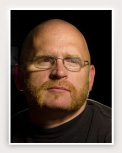T.J. Leyden was not a nice young man. As a teen in Redlands, California, he joined a group of skinheads and soon was leading his own group. At 21, he enlisted in the Marines and continued recruiting, organizing, and propagandizing for the white supremacist movement within the Corps. That was his life for 15 years, in and out of the Marines—preaching white supremacy, beating up and stabbing people, eluding the law, and involving susceptible teenagers in hate-fueled action.
It all started to change while he was watching a television show featuring some dark-skinned—probably Caribbean, Leyden now thinks—performers. His three-year-old son switched off the show and uttered a racial epithet. At first, he thought, Good for you! Then he began to worry: What was he modeling for his son? What kind of person would his son turn out to be? He began to rethink his attitudes as well as his behaviors. Not long after the TV incident, he was attending an Aryan Nations Congress and asked someone sitting next to him, "If we wake up tomorrow and the race war is over and we've won, what are we going to do next?" The person jokingly replied, "We're going to start on hair color."
Leyden realized that, joke or not, it wasn't too far off the mark: "Next it'll be you have black hair so you can't be white, or you have brown eyes so somebody in your past must have been black, or you wear glasses so you have a genetic defect." He realized he had to leave the movement.
His first move was to tell his mother he was leaving the aryans and to apologize to her for all he had put her through—she'd been horrified by what her son had been doing. She urged him to see, of all people, a rabbi at the Museum of Tolerance, and the rabbi asked Leyden if he'd consider talking to others about the hate spewed by the white supremacists and skinheads. That was clearly dangerous, but Leyden agreed—in a small way, at first. Here's how Leyden remembers it:
"I hit my very first junior high and I did my very first talk. Twenty-four hours later, the white supremacy movement had six websites about me. One website actually said, 'Terminate on sight.' There's two cassettes that are literally 90 minutes of 'We know where you live,' 'We're going to come kill you,' 'We've got your number, man,' 'You better watch your back.'"
But threats notwithstanding, Leyden stayed with his turnaround. He was used to living dangerously: "When I was in the movement, I could have been killed because of a rival gang, could have been killed by guys inside my own group. It's no different now. Now I'm just doing something right."
Leyden started naming names and speaking out more forcefully against his former peers. In the '90s he began working with the Simon Wiesenthal Center's Task Force against Hate. He spoke at the Clinton White House Conference on Hate. He was a major contributor to California Governor Gray Davis's advisory panel on hate groups. He's trained employees of the Department of Justice, the Pentagon, the FBI, the military, and law enforcement. He's spoken to hundreds of educators and over a million students. And in 2001, he and his wife, Julie, founded StrHATE Talk Consulting which "combats hate, bigotry, intolerance and discrimination through education."
Leyden has helped a lot of people in his new life, especially teenagers considering joining gangs and adopting the white supremacy attitudes he himself once professed. As far as his past life goes, Leyden is clear and honest: "I look at myself as two people: who I am now and who I was then. I see the destruction I did to people by bringing them into the movement, the families I hurt. I ruined a lot of lives. That's the biggest thing I have to pay back. I don't forgive myself. Only my victims can forgive me."
Update: T.J. Leyden was stricken with brain cancer in 2013 and underwent major surgery, plus renewed attacks from white supremacists who called his opposition to them delusional, caused by damage to his brain. Leyden' sons are not in the skinhead movement.

